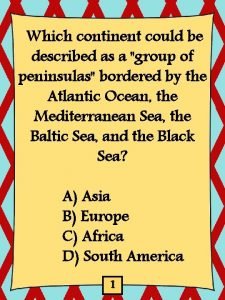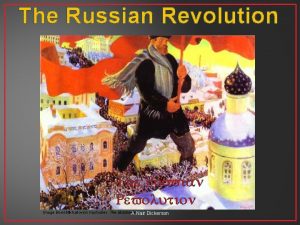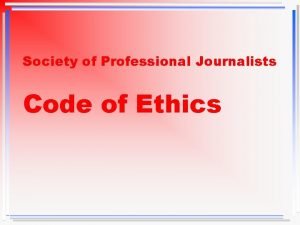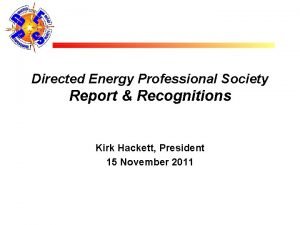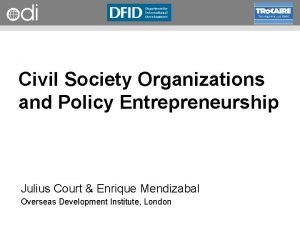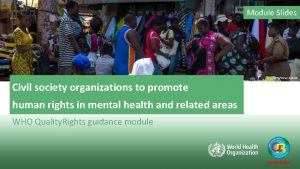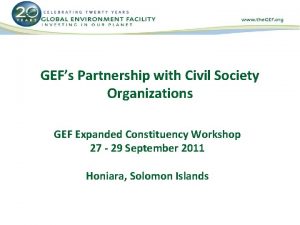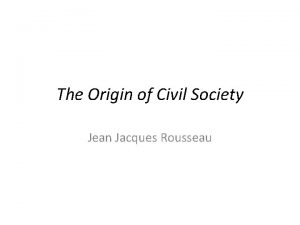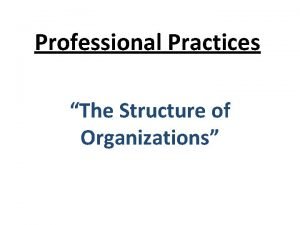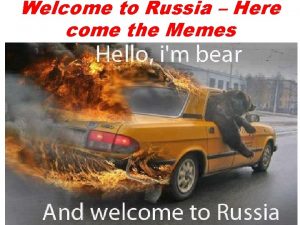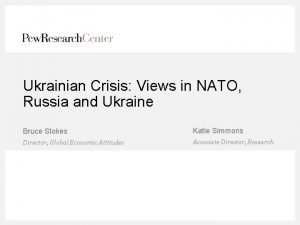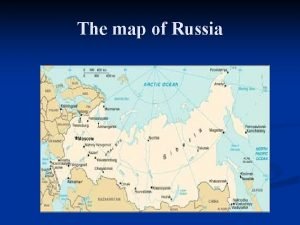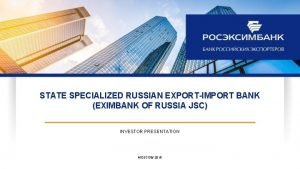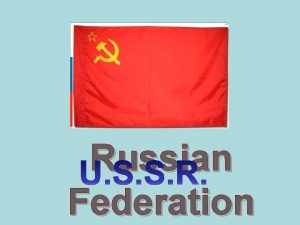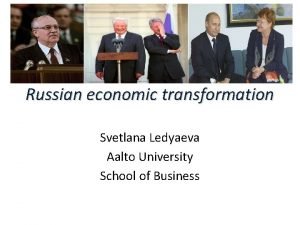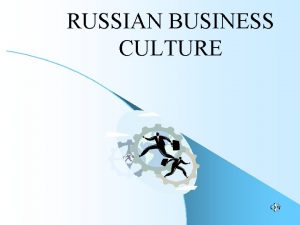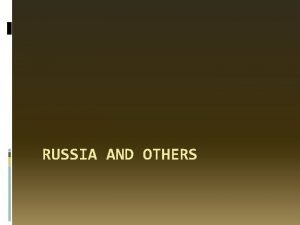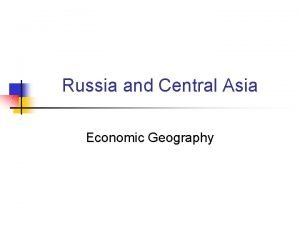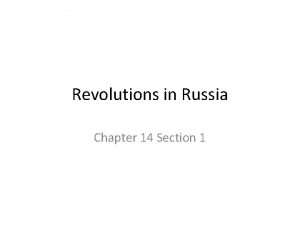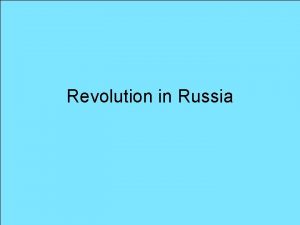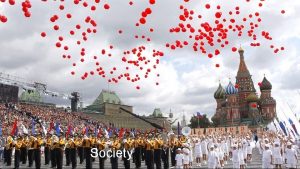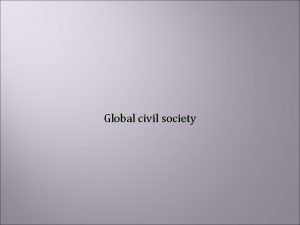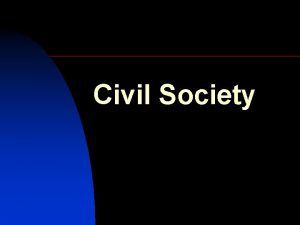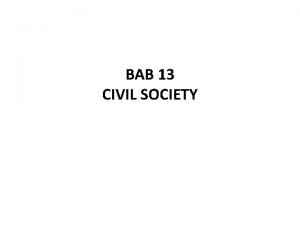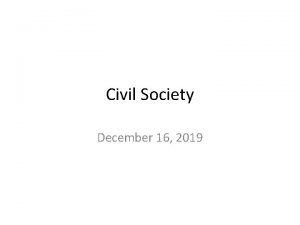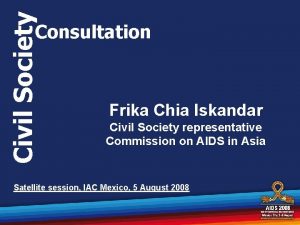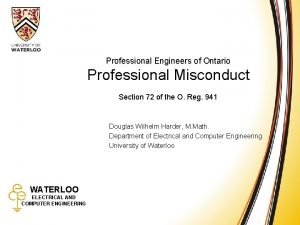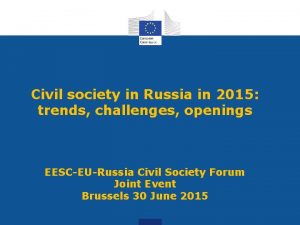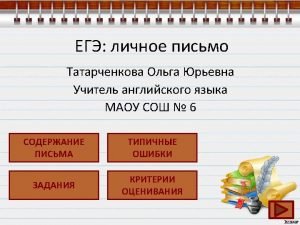Civil Society of Russia Civil society structure Professional






























- Slides: 30

Civil Society of Russia

Civil society structure Professional community Environmental organisations Expert society Public Unions Interest clubs NGO Business Female organisations Politics Assosiations Parties Charity organisations Consumer cooperatives Family

Scale of civil society in Russia 600 000 359 020 Formal + informal Officially registered 70 000 Civil society structures, «Alive» NGO 1 -2 million take part in politics and power structures 10 -12 million NGO activists Potentially active 25 -30 million people 4 -5 million Businessmen, managers, owners Economically active population – 75 million (51%) Unemployed – 5 milllion (6, 5%) Population (older than 15) – 121 million people (83%) Russian population total – 145 million people

Social and economic background of civil society

Satisfaction with life Are you satisfied with your life?

Opinion about own situation Which of the following statements corresponds to your life situation in the family?

• Very rich - • Middle class 1 -2 % (2 -3 million) - 20% (30 -35 million) • Between middle and rich- 60 -65% (95 m) • Poor - 14% (20 million)

New feelings Which feelings have got the people recently? Ho po si tiv e pe le ss § Hope 34% § Self respect 16% § Confidence in the future 15% § Feeling of freedom 14% Sense of responcibility for current situation: § around 9% § in the country 7% negative. § Shame for Russian people 33% § Shame for what is going on 18% § Envy 13% § Spite, aggressiveness 18% § Exhaustion, apathy 33% § Loneliness, solitariness 13% § Fear 13% § Perplexity 16% § Despair 13%

What worries people? Locally In General Price rise, devaluation - 66% Unemployment - 47% Health degradation, Inability to get good health care - 53% Low level of pensions and salaries - 66% Powerty threat Police’s abuse of power Threat of theft, assualt 28 -30% Bureaucrats’ arbitrariness Drugs Utility’s costs - 55% Bad roads - 36% Alcoholism - 43% Emmigrants (including western) - 12% Polices’s abuse of power - 10% In the family Price rise - 68% Lack of money and time to solve family problems - 52% Lack of good healthcare - 30% Lack of money to follow one’s position in the society - 25%

Most important human rights for Russian citizens 1994 2000 October 2005

Potential of social support: expectations If you had hard life problems where would you get help?

What can you meet among others? How often do you think you can meet people who is ready to help each other?


Civil activity of the population

People’s opinion about importants civil actions

NGO portrait

NGOs distribution according to legal form, % 16 forms of NGO

1. • • • 2. 3. 4. 5. 6. 7. 8. 9. 10. 11. 12. 13. 14. 15. 16. 16 forms of NGO: Public unions (include 6 legal forms): Public organisations (including trade unions) Social movements Social funds Social agency Organ of social self-activity Parties Religious organisations Funds Autonomous non-profit organisations Non-profit partnership State corporation Agency Assocication (unions) Consumers cooperative Non-state pension fund Notary chamber Lawyers’ agency (colleaugues, bureau, chamber) Union of employers Felowships (summer houses, gardens) Housing cooperative Community of native minorities

NGO structure in Russia NGO distribution on activity type, %

According to Justice Ministry in 2007 • 227, 577 NGOs operated • 17% of all NGOs were inspected • Over 11, 000 NGOs were refused in registration • Courts received over 8, 274 lawsuits to close doen NGOs.

NGOs distribution according to years of operation

NGO staff Quantity of NGO stuff, 2005 -2007 Average quantity of staff in NGO 2005 2006 2007 21 21 22

NGOs’ financing sources Main sources of NGOs’ financing ü ü ü

NGOs’ structure according to income sources

Evaluation of NGOs financing level Answers from NGOs chiefs

Main NGOs problems: evaluation of the leaders

NGO and Power NGO must… 1. Position of citizens Authorities should help only useful NGOs Authorities should help NGOs 22%: NGOs should help citizens in conflicts with power Autorities should not help NGOs 2. Position of municipal bureaucrats Mutually develop and implement socially important programs Protect citizens’ interests against power Help authorities with initiatives Do their business and not address to authorities too often Use power for their initiatives 3. Position of NGOs activists Help citizens with their conflicts with power Help power in its initiatives Not take part in activity of the authorities

What the state must demand from NGOs in exchange for its support: opinion of the poplulation

Evaluation of social institutions’ usefulness

State and human rights organisations: opinion of the polulation 52% of Russian citizens believe State and local authorities must provide financial support, tax and other benefits to human rights organisations.
 What divides european russia from asian russia
What divides european russia from asian russia Civil rights and civil liberties webquest
Civil rights and civil liberties webquest In the view of this cartoonist russia under
In the view of this cartoonist russia under Code of ethics society of professional journalists
Code of ethics society of professional journalists Indiana society of professional engineers
Indiana society of professional engineers Directed energy professional society
Directed energy professional society Boston society of civil engineers
Boston society of civil engineers What is civil society organization
What is civil society organization What is civil society organization
What is civil society organization What is civil society organization
What is civil society organization What is civil society organization
What is civil society organization What is civil society organization
What is civil society organization Rousseau the origin of civil society
Rousseau the origin of civil society Gertler econ
Gertler econ Structure of organization in professional practice
Structure of organization in professional practice Structure of medieval society
Structure of medieval society Russian dash cam meme
Russian dash cam meme Russia nato
Russia nato Genetic engineering conclusion
Genetic engineering conclusion 1985 russia map
1985 russia map Why was russia ripe for revolution ww1
Why was russia ripe for revolution ww1 Eximbank of russia jsc
Eximbank of russia jsc Russia london
Russia london Map of russia
Map of russia Svetlana ledyaeva
Svetlana ledyaeva Business etiquette russia
Business etiquette russia Major landforms in russia
Major landforms in russia Russia resources
Russia resources Czars resist change
Czars resist change Revolutions in russia chapter 14 section 1
Revolutions in russia chapter 14 section 1 Russia physical characteristics
Russia physical characteristics
